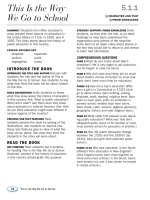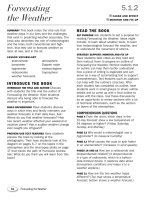- Trang chủ >>
- Mầm non - Tiểu học >>
- Lớp 5
5 5 1 the sandwich brigade
Bạn đang xem bản rút gọn của tài liệu. Xem và tải ngay bản đầy đủ của tài liệu tại đây (4.52 MB, 16 trang )
Suggested levels for Guided Reading, DRA,™
Lexile,® and Reading Recovery™ are provided
in the Pearson Scott Foresman Leveling Guide.
The
Sandwich Brigade
by Jason Lublinski
Genre
Realistic
fiction
Comprehension
Skills and Strategy
• Character and Plot
• Theme
• Prior Knowledge
Scott Foresman Reading Street 5.5.1
ISBN 0-328-13564-X
ì<(sk$m)=bdfgeg< +^-Ä-U-Ä-U
illustrated by Don Dyen
Dyen
Reader Response
1. Describe Herb’s attitude at the beginning of the story
and at the end of the story. Give examples using a
chart like this one:
The
Sandwich Brigade
Herb’s Attitude
at the Beginning
EXAMPLES
Herb’s Attitude
at the End
EXAMPLES
by Jason Lublinski
illustrated by Don Dyen
2. What did you know about volunteer programs before
you read this book? How did this prior knowledge
help you understand what you read?
3. A spectacle is something seen or viewed. Spectacles
are eyeglasses. What do the two words have in
common?
4. Why do you think Herb gets more satisfaction from
the Sandwich Brigade than from any of the other
activities he tries?
Editorial Offices: Glenview, Illinois • Parsippany, New Jersey • New York, New York
Sales Offices: Needham, Massachusetts • Duluth, Georgia • Glenview, Illinois
Coppell, Texas • Ontario, California • Mesa, Arizona
CONTENTS
Chapter 1
Bored with Nothing to Do
4
Chapter 2
The Element of Surprise
7
Chapter 3
No Luck with Hamlet
11
Chapter 4
Free Lunch
15
Chapter 5
The Sandwich Brigade
20
Chapter 6
Visitors
23
Chapter 7
Something Special Happens
25
Every effort has been made to secure permission and provide appropriate credit for
photographic material. The publisher deeply regrets any omission and pledges to
correct errors called to its attention in subsequent editions.
Unless otherwise acknowledged, all photographs are the property of Scott Foresman,
a division of Pearson Education.
ISBN: 0-328-13564-X
Copyright © Pearson Education, Inc.
All Rights Reserved. Printed in the United States of America. This publication is
protected by Copyright, and permission should be obtained from the publisher
prior to any prohibited reproduction, storage in a retrieval system, or transmission
in any form by any means, electronic, mechanical, photocopying, recording, or
likewise. For information regarding permission(s), write to: Permissions Department,
Scott Foresman, 1900 East Lake Avenue, Glenview, Illinois 60025.
2 3 4 5 6 7 8 9 10 V0G1 14 13 12 11 10 09 08 07 06 05
3
Chapter 1
Bored with Nothing to Do
Herb Battleby was bored. Not just a little bored.
He was bored out of his skull. He had been that way
for three months, ever since he’d retired.
Herb was sixty-five years old. He had spent most
of his adult life reviewing movies for a chain of
newspapers, but now he rarely saw any movies at all.
He and his wife, Eden, had moved to Benderville, her
hometown in upstate New York. The nearest movie
theater was ten miles away. Herb didn’t like to drive
much, and because they had lived in New York City,
Eden had never had to learn.
Returning from a walk one morning, he ran into
Bob Becker. “What’s doing?” Herb said. Bob was a
small man about three years older than Herb.
“Not much,” said Bob. “A couple of errands for
Dolores.” Bob’s wife, Dolores, was a lawyer. She
continued to work, although Bob had retired a year
ago. “I putter around a lot these days.”
4
“Crazy, isn’t it?” Herb said. “When you’re
working, retirement seems like this marvelous goal.
Then you get there, and . . .”
“And you wonder how to use your time. Medicine
was my life. Now it’s gone. Maybe the Internet has
some answers. The Chamber of Commerce Web site
lists weekly activities.”
“It can’t hurt,” Herb said.
Down in Bob’s basement, they logged onto the
Chamber of Commerce Web site. They found that
Rick’s Karate Studio was offering special self-defense
classes for senior citizens.
“Karate!” said Bob. “Now there’s something I’ve
always wanted to learn.”
5
Herb wondered whom they needed to defend
themselves from, but he said, “Let’s try it. It’s nearby,
at the intersection of Sullivan Street and Third
Avenue.”
Bob turned back to the screen.
“Clay!” he said.
“What?” asked Herb.
“A pottery class! What a gas!”
When Herb didn’t protest, Bob kept scrolling.
“We ought to find one more activity,” Bob said. “The
others may not work out.”
He scrolled down the page. “Hey, the public
library has a discussion group.”
“What do they discuss?”
“Literature, of course. Next Thursday they’re
tackling Hamlet.”
“Now that’s more up my alley,” said Herb.
Bob shut down the computer. “Do you mind if
Pete Lichtner comes along?” he asked. “He’s been at
loose ends since Janice died.”
“Janice? His wife? She died?”
“Yes, it happened last year,” Bob said. “Pete has
been hanging around the house doing nothing
ever since. His interest in everything seems to have
withered.”
“Okay,” Herb said. “Let’s bring in Pete. The three
of us are in the same boat, and if it sinks, we might
as well go under together.”
6
Chapter 2
The Element of Surprise
On Monday morning, the three men met at Sensei
Rick’s Karate Studio wearing sweatsuits. About thirty
seniors crowded the main work-out room. Herb
noticed a frail man who wore a hooded sweatshirt
with the word IOWA on it.
“What could a guy like that do?” Herb whispered
to Bob. “He looks so weak.”
“Cool it,” Bob whispered back.
The instructor was a trim man with an enormous
black mustache. “Hello, everyone!” he said. “My
name is Rick Elbone, but everyone calls me Sensei
Rick. Has anybody here studied the martial arts
before?”
7
The man in the Iowa sweatshirt raised his hand.
“Yeah, right,” Herb whispered.
“One hand—that’s great,” said Sensei Rick. “Don’t
worry if you’re new to this. This is a beginners’ class,
and we’ll start at the beginning. Choose a partner,
and we’ll run through some simple drills.”
Pete and Bob teamed up with each other, leaving
Herb to find a partner elsewhere. He felt a finger jab
him in the back. It was the Iowa sweatshirt.
“Ready for some fun?” asked the withered little
man.
“Not really,” Herb said. “Are we partners?”
“You bet we are,” the man said, extending his
hand. “Call me Bent. That’s short for Bentley.”
“I’m Herb. Go easy on me.” He didn’t mean it.
Clearly Bent was too weak to do him any damage.
The class practiced basic punches, basic blocks,
and even a few kicks. There was no body contact,
and Herb was surprised to discover he was enjoying
himself. Then Sensei Rick had them move on to
simple self-defense exercises.
“Let’s practice the basic throw,” he said.
“Basic what?” Herb asked.
“Throw,” Bent said, and before Herb knew what
had happened, he was lying flat on his back on the
floor. “Sensei!” Herb yelled. “Call him off! He’s trying
to kill me!”
8
9
Sensei Rick stepped between them. “Something
wrong here?”
“Something wrong?” Herb said. “This guy’s
dangerous!”
“He threw you?”
“You bet he did,” snapped Herb. “Without
warning.”
“Surprise is an important element of martial arts,”
said the instructor.
“Of murder, too,” said Herb.
“I’ll tell you what, gentlemen. Forget the basic
throw. Try the shoulder throw. It’s much more
effective anyway.”
“The shoulder throw?”
Sensei Rick pondered the question, wondering
how to respond. “It’s easy,” he said finally, pulling
Herb to his feet. “I’ll show you.”
An hour later, Pete and Bob helped Herb out onto
the street. A nasty bruise was causing a severe pain
in his left thigh. “I feel like I’ve been beaten up by a
gang of thugs,” he said.
“But it was just one little 82-year-old guy,” Pete
said with a laugh. “I guess he wasn’t so weak after
all.”
Herb glared at him.
“Okay, that’s it for karate,” Bob said. “Tomorrow,
we try pottery.”
10
Chapter 3
No Luck with Hamlet
Pottery was a fiasco. Herb’s pottery wheel spun
out of control, and he ended up with a big clump
of clay stuck to his face. The loudest laughter came
from Pete. It was an act of treason Herb promised
himself he would never forgive.
“If it weren’t for Bob,” he told Eden after he got
home, “I’d have gotten up and slugged Pete. I really
would.”
“Hold still, dear,” Eden told him as she combed
dried clay out of his eyebrows. “This won’t hurt.”
Herb wanted more sympathy. “It’s easy for you,”
he told her. “You’re a social worker, and you have a
job to go to everyday.”
“Herb,” she said. “Hold still!”
“I am.”
“Maybe the book club will work out on Thursday
night,” Eden said. “You always said Hamlet was your
favorite Shakespearean play.”
11
But the reading group ended badly, too. Very
badly.
The moderator was a perky librarian named Betty
Drago. She began by asking for a volunteer to give a
one-sentence summary of the plot.
A woman about Herb’s age raised her hand. “It’s
about a Danish prince named Hamlet who goes crazy
trying to decide whether or not to kill his father’s
murderer.”
A boy around eleven years old raised his hand.
His large spectacles made him look like a very young
scientist.
“Yes, John,” Betty said.
“Sally forgot to say that the murderer is Hamlet’s
uncle and also his mother’s husband. Weird, huh?”
“Phew!” Pete laughed. “No wonder Hamlet loses
it!”
“Who wants to comment on the play?” Betty
asked.
John raised his hand. “I do,” he said. “This is a
ridiculous play. Who cares about a guy who spends
his time wringing his hands? He should have been
wringing his uncle’s neck!”
“You wanted more action?” Betty asked.
12
“More anything,” John said.
“I’d like a little plain English,” a young woman
chimed in. “What’s the sense of Shakespeare trying
to impress us with big words?”
Herb couldn’t hold his tongue. “That’s idiotic,” he
said. “Shakespeare is one of the greatest playwrights
of all time!”
“So what?” said the young woman. “Einstein
must have had bad days, too.”
Herb looked up at Betty, hoping she would
intervene. She didn’t, so he let himself go. “And
Hamlet is one of the greatest plays of all time!”
“Sir, that may be true,” John said. “But it just
doesn’t click with some of us. What if James Bond
just sat around wondering what to do next? Boring,
right?”
Herb erupted. “I’ve never seen so much stupidity
packed into one room!” he said.
“Mr. Battleby,” Betty said sternly. “You must
control yourself!”
“Control myself? When I’m surrounded by idiots?”
“I can’t believe you got us thrown out of a book
discussion group,” said Pete as he drove Bob and
Herb home.
“Ah, it was a dumb group, anyway,” said Herb.
“Gentlemen,” Bob said, “three strikes and we’re
out. What do we do now?”
“I have an idea,” said Pete. “We’ve been focused
on what would be fun for us. How about if we did
something that would be good for somebody else?”
13
“I’m not following you,” said Herb.
“I mean, let’s figure out how we can fill our spare
time helping others,” said Pete.
“Doing what?” Herb asked.
“I don’t know,” said Pete. “I mean, I don’t know
who needs help around here. But there’s always
somebody, isn’t there?”
“You know,” Bob said, “helping people is what
I’ve been missing since I stopped practicing medicine.
I’d like to start again.”
“I hate to say it,” said Herb. “But you’re right,
Pete. Instead of worrying about ourselves, we ought
to be worrying about someone else.”
Pete grinned. “Now all we’ve got to do is figure
out who needs help.”
14
Chapter 4
Free Lunch
Eden was the one who gave them direction. As
a social worker for the County Board of Health, she
was aware of a lot of people who needed help. “We
don’t have any homeless people here,” she said to
Herb over breakfast the next morning. “But we have
a lot of old and disabled people who live alone and
could use some tender loving care.”
Herb telephoned Bob after breakfast. “Eden says
a lot of shut-ins need help,” he said.
“How many?” Bob asked.
“Let’s call around and find out,” Herb said. “I’ll
call Pete and tell him what we’re up to.
15
Bob got the names of about fifty shut-ins by
calling all the doctors in town. Eden collected more
than thirty from the Board of Health.
After a day of phone calls, they had the names
of eighty-eight people who lived alone and were
either disabled, having trouble getting to a store
or cooking, just plain lonely, or all three. “I read in
a medical journal that more than half of all elderly
patients who are hospitalized are suffering from
poor nutrition,” Bob said. “Let’s find a way to enable
our elderly to eat better.”
“Why not start a free lunch service?” Pete said. “A
way to get nutritious food to them?”
“Bingo,” said Herb. “I believe we’ve found a way
to fill our days.”
The next morning, the men met for a late
breakfast at the Benderville Diner. “What we’ve got
to create is a charity,” said Pete. “First, we have to
recruit and train volunteers. Second, we have to find
a way to manufacture the product—the sandwiches.
Finally, we have to raise the money to pay for it all.”
“I’ll go after the money,” Bob said. “I’ll contact
religious groups, the city, and businesses. I can’t see
why they’d turn us away.”
“I’ll see what kind of discounts we can get on
food,” Pete said.
“That leaves the job of finding and training
volunteers,” Herb said. “I’ll take it.”
16
Over the next few weeks, Bob got the city
government and local businesses to fund part of the
effort. The newspaper committed to sponsoring an
annual fund drive. “So far,” Bob reported to Pete
and Herb, “I’ve only got I.O.U.’s. But I expect the
money to begin to flow in about a month.”
Pete had good news, too. “Both supermarkets
in town will sell us all the supplies we need at a big
discount,” Pete said. “The Congregational Church
will let us use their kitchen as a sandwich factory.
Now all we need are the worker bees.”
“That’s my department,” said Herb. “I’ve signed
up thirty-six volunteers so far. I have an idea of how
to get more.”
17
He held up a flier he had printed up. “Join the
Sandwich Brigade!” it said in big type. “Benderville’s
Homebound Citizens Need You!” Two paragraphs
explained the program. Herb had put his telephone
number and e-mail address at the bottom of the
page.
“Great idea,” said Bob.
“What are we waiting for?” said Pete, taking off
his spectacles. “A month from today is April 24. Let’s
make that our D-day, the day we get the Benderville
Sandwich Brigade up and running.”
Herb had thought of dropping off fliers at the
library weeks before. Its snug, quiet rooms made it
his favorite place in town, but he had been avoiding
it since the night he was ejected from the discussion
group. Yet he decided he couldn’t avoid it. It was the
perfect place to recruit retirees who had some spare
hours for volunteer work.
He entered the library in the late afternoon. As
he had feared, Betty sat at the information desk. But
she let him off with a smile. “Mr. Battleby,” she said,
as if she had been looking for him. “I’m so glad to
see you! I was worried that you’d stay away forever,
and I know how much books mean to you.”
“Well, I deserve to stay away,” he said sheepishly.
“Oh, I know how hard it is to listen to people
criticize something you care a lot about.”
“Thanks, Betty, but I was really out of line. There’s
nothing more disruptive than an old man with
nothing to do.”
“Mr. Battleby! You’re not an old man, and you
know it. And that bundle you’re carrying tells me
you’ve got something to do.”
18
“Yes, I finally do,” he said. He explained his
mission, and she put the flyers on the checkout desk
where borrowers would see them. “I’ll also mention
it to the book group tonight,” she said. “I know
there are a few people there with time on their
hands.”
“Oh, don’t do that. After the way I misbehaved, I
doubt anyone would want to join me in anything.”
“Nonsense. The Sandwich Brigade is a wonderful
idea, and I bet no one in Benderville realized it was
needed until now. Everyone should know about it.”
“You know,” Herb told Eden when he got home
that night, “there’s a lot more to do in this town than
I thought. Just getting acquainted with the people
here, that’s a pleasure in itself. There’s a warmth in
Benderville that I didn’t feel when we lived in New
York City, as much as I loved the place. The world
moves more slowly here. I think I’m liking it.”
The next two weeks were frantic. Herb spent
hours on the phone, speaking with housebound
seniors and volunteers. He spent four days just
driving around the city to find out where the
Brigade’s clients lived. He wanted to match them
and the volunteers by neighborhood when it was
possible. He put a big map of Benderville on the wall
of his basement office. Yellow pins showed where
the seniors lived, and blue pins indicated where
the volunteers lived. He was finally ready to make
assignments.
19
Chapter 5
The Sandwich Brigade
Two weeks later, the first meeting of the
Benderville Sandwich Brigade took place in the
basement of the Congregational Church. Nearly
fifty volunteers showed up. Most were retirees with
plenty of energy, and all were eager to contribute
to their community. Some were younger, including
Betty Drago. It was her day off.
Bob welcomed the group. “Across the country,”
he told them, “about 10 million elderly Americans
live alone. We’re not sure how many live alone in
Benderville, but with your help, we’re going to
find out. We expect to find that most of them are
doing okay, thanks to the money they get from
Social Security, pensions, and personal savings. But
coping with daily tasks like dressing, shopping, and
cooking can be a challenge for all of them, and so
can loneliness. So making sure our elderly eat well
is only one of our goals,” he went on. “We’re also
going to make sure they’re safe and healthy and, if
not, get them proper help. We want them to know
that people in our community care about them and
are grateful for the contributions they made in their
time. So this is important work, and I suspect most of
you are here because you know that.”
20
The volunteers nodded in agreement, and Bob
introduced Pete.
“Hi,” Pete said. “I’m the factory foreman. I’m
responsible for getting supplies in here and the
meals made. We’re going to start out simply,” he
continued. “We’ll prepare lunches only three times a
week until we get the hang of it. Simple lunches, just
a sandwich, some chips, and a container of juice.”
Herb stood up. “I’m going to keep the scheduling
as simple as the lunches,” he said. “I’ll ask each of
you to give three hours a day every three days. Three
hours should be enough time to make, pack, and
deliver five or six meals and spend a little time with
our new friends. We’ll go in teams of two today, but
in the future you’ll be on your own. Each team will
visit three shut-ins—the ones you telephoned this
morning.
Pete pointed to a row of ten tables set end to
end. “That’s the factory,” he said.
The tables were covered with sandwich-making
supplies: loaves of bread, wedges of cheese, lots of
sliced meat. “Please pack your meals in the cartons
on the last table. And people, thank you. You are
very special.”
21
Chapter 6
Visitors
Shortly after noon, Herb knocked on the front
door of a tiny house at 125 State Street. His partner
was Sally Davis, another retiree. It seemed to Herb
that he had met her before, though he couldn’t
remember where. “Hello,” Sally called out. “Hello,
Mrs. Carmichael. Are you home?”
After a few minutes, a frail voice responded. “I’m
not home,” the voice said. “Whatever you’re selling,
I’ve already got. Please go away.”
“Mrs. Carmichael, we’re from the Sandwich
Brigade,” Herb said. “I called you yesterday to say we
were going to drop by.”
A few seconds later, the two visitors were smiling
down at a small woman who was bent and withered
with age. “Excuse me,” she said, smiling back. “I’m
ninety-one years old, you know, and not as social as I
once was.”
“Well, we’re going to fix that,” Herb said. Herb
and Sally introduced themselves. “May we come in?”
Sally asked.
“Why, yes,” said Mrs. Carmichael. “You’re the first
visitors I’ve had in ages.”
She led them to her small but tidy kitchen. Sally
set the carton she was carrying on a table. “We
brought a ham-and-cheese sandwich,” she said. “If
you don’t like ham and cheese, I want you to tell us.”
22
23
“Oh, thank you, dear,” Mrs. Carmichael said. “I’m
not fussy, really. I can get awfully hungry.”
“Good,” Sally said. “Because we’ve also brought
some potato chips and apple juice.”
“That’s so nice,” the old lady said. “Won’t you sit
down?”
They chatted for fifteen minutes around the
table. They learned that Mrs. Carmichael had been a
teacher, and that her closest relatives lived hundreds
of miles away. “And you know, when you get to be
my age,” she said, “most of your friends are dead.
I’ve been alone for a long time. You’re so nice to
come.”
“One of us will be here three days a week,” Herb
said. “Later, we’ll be here for five. You’d better get
used to us.”
“That won’t be hard,” she said.
Everyone they visited that day was different. One
was an old man whose wife had died recently and
who had no idea how to make a healthy meal. Sally
gave him a shopping list and wrote out a simple
recipe for him.
One day, they visited a woman who stayed in her
apartment most of the time. “Those five flights of
stairs are too much for me,” she said.
“They’d be too much for me, too,” Herb said. As
the two visitors got up to leave, she said, “Thank you
for the sandwich, young man.”
“Why, thank you,” Herb said. “It’s been a long
time since anyone called me that.”
24
Chapter 7
Something Special Happens
Two months later, the Brigade was thriving.
Thanks to an article about it in the Benderville Times,
the number of elderly people that the Brigade served
every day had mushroomed. And so had the roster of
volunteers.
Young people became an important part of the
effort. Teenagers washed cars and mowed lawns
to raise money for the Brigade. John, the one who
looked like a young scientist, organized a group of
fellow fifth graders to run errands for the elderly
twice a week. They even checked out library books
for people who asked for them.
“I can’t get over it,” Bob said to Herb and Pete
one sunny Sunday afternoon in July. The three men
were sitting on Bob’s porch, having a late lunch.
“Can’t get over what?” asked Herb.
25
“I mean, it’s eerie how well everything has turned
out. Look at us. A few months ago, we were a bunch
of bored, listless retirees. We didn’t know what to
do with ourselves. Now we’re so busy we’ve only got
Sundays to ourselves.”
“Thank goodness for that,” Pete said.
“Hamlet should have done something like this,”
Herb said.
“Set up a sandwich brigade?” Pete asked.
“Why not? That kid had too much time on his
hands. Like the boy in the library said, he needed
to do something—anything. Why not a sandwich
brigade? There must have been a lot of hungry
people in Denmark then.”
“Herb,” said Bob. “I never thought I’d hear you
make a joke about your favorite play.”
“Well, I never thought I’d be scheduling visits to
shut-ins, either,” Herb said. “You know, I’ve never
done anything I’ve been prouder of in my life.”
“You know,” Bob said with a smile, “I think you’re
finally becoming a real human being.”
“Well, I wouldn’t go that far,” Herb said.
“Something special happens when you help
others,” Pete said. “You end up helping yourself just
as much—maybe more.”
26
27
Bringing Food to
Those Who Need It
The granddaddy of all programs providing food
for the elderly is Meals on Wheels. The program got
its start in 1939 in Great Britain. World War II had
just begun, and German planes were bombarding
London and other British cities. Bombed out of their
homes, thousands were unable to prepare food for
themselves. Members of the Women’s Voluntary
Service for Civil Defense filled the gap, bringing
freshly cooked meals to families in need. During
emergencies, they drove refreshments to soldiers and
firefighters in mobile snack bars. Soldiers nicknamed
the snack bars “Meals on Wheels.”
The idea of setting up programs to bring meals
to the elderly didn’t reach the United States until
after the war. In 1954, high school students began to
prepare, package, and deliver meals to homebound
seniors in Philadelphia, Pennsylvania. Today,
volunteers operate more than 20,000 Meals on
Wheels programs in communities all over the United
States. They provide the elderly with more than 250
million meals every year.
A Meals on Wheels
volunteer delivers food
to an elderly man
who lives alone.
According to one study,
about five million
elderly Americans don’t
get enough to eat.
28
Reader Response
1. Describe Herb’s attitude at the beginning of the story
and at the end of the story. Give examples using a
chart like this one:
Herb’s Attitude
at the Beginning
EXAMPLES
Herb’s Attitude
at the End
EXAMPLES
2. What did you know about volunteer programs before
you read this book? How did this prior knowledge
help you understand what you read?
3. A spectacle is something seen or viewed. Spectacles
are eyeglasses. What do the two words have in
common?
4. Why do you think Herb gets more satisfaction from
the Sandwich Brigade than from any of the other
activities he tries?









